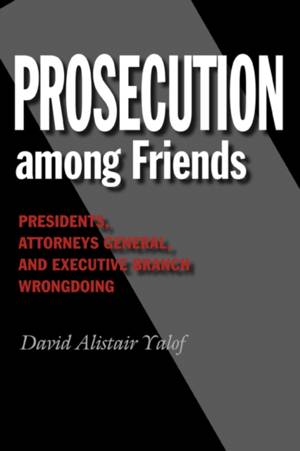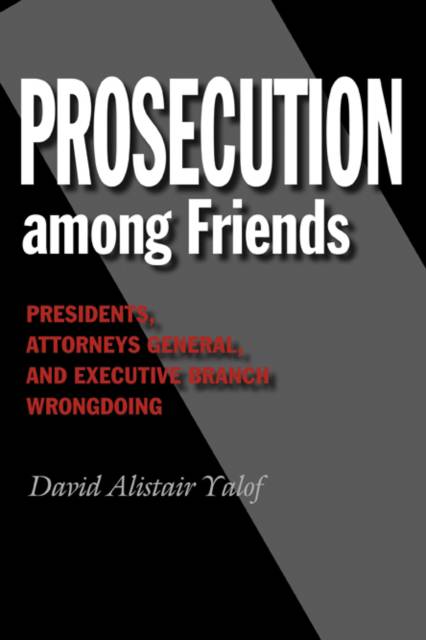
En raison d'une grêve chez bpost, votre commande pourrait être retardée. Vous avez besoin d’un livre rapidement ? Nos magasins vous accueillent à bras ouverts !
- Retrait gratuit dans votre magasin Club
- 7.000.000 titres dans notre catalogue
- Payer en toute sécurité
- Toujours un magasin près de chez vous
En raison de la grêve chez bpost, votre commande pourrait être retardée. Vous avez besoin d’un livre rapidement ? Nos magasins vous accueillent à bras ouverts !
- Retrait gratuit dans votre magasin Club
- 7.000.0000 titres dans notre catalogue
- Payer en toute sécurité
- Toujours un magasin près de chez vous
Prosecution Among Friends
Presidents, Attorneys General, and Executive Branch Wrongdoing
David Alistair Yalof
72,45 €
+ 144 points
Format
Description
Can Justice Department officials effectively investigate wrongdoing within their own administration without relying on an independent counsel? In Prosecution among Friends political scientist David Alistair Yalof explores the operation of due process as it is navigated within the office of the attorney general and its various subdivisions. The attorney general holds a politically appointed position within the administration and yet, as the nation's highest ranking law enforcement officer, is still charged with holding colleagues and superiors legally accountable. That duty extends to allegations against those who had a hand in appointing the attorney general in the first place: Even the President of the United States may be enmeshed in a Justice Department investigation overseen by the -attorney general and other department officials. To assess this fundamental problem, Yalof examines numerous cases of executive branch corruption-real or alleged-that occurred over the course of four decades beginning with the Nixon administration and extending up through the second Bush administration. All of these cases-Watergate, Whitewater, and others-were identified and reported to varying degrees in the press and elsewhere. Some garnered significant attention; others drew only limited interest at the time. In all such cases the attorney general and other officials within the executive branch were charged with initially assessing the matter and determining the proper road for moving forward. Only a handful of the cases resulted in the appointment of a statutorily protected independent counsel. The primary focus of this book and the case studies that support it center on how the conflicting loyalties of the attorney general and others are resolved when executive branch corruption is at issue. As Yalof demonstrates, the particular circumstances surrounding a given investigation matter a great deal. When the media spotlight, for example, is not so glaring, career prosecutors with limited partisan biases can effectively treat the case like other routine matters. Prosecution among Friends affords readers a greater understanding of the political and legal tradeoffs inherent when the executive branch must investigate and prosecute its own.
Spécifications
Parties prenantes
- Auteur(s) :
- Editeur:
Contenu
- Nombre de pages :
- 224
- Langue:
- Anglais
- Collection :
Caractéristiques
- EAN:
- 9781603447447
- Date de parution :
- 03-08-12
- Format:
- Livre relié
- Format numérique:
- Genaaid
- Dimensions :
- 152 mm x 229 mm
- Poids :
- 458 g

Les avis
Nous publions uniquement les avis qui respectent les conditions requises. Consultez nos conditions pour les avis.






